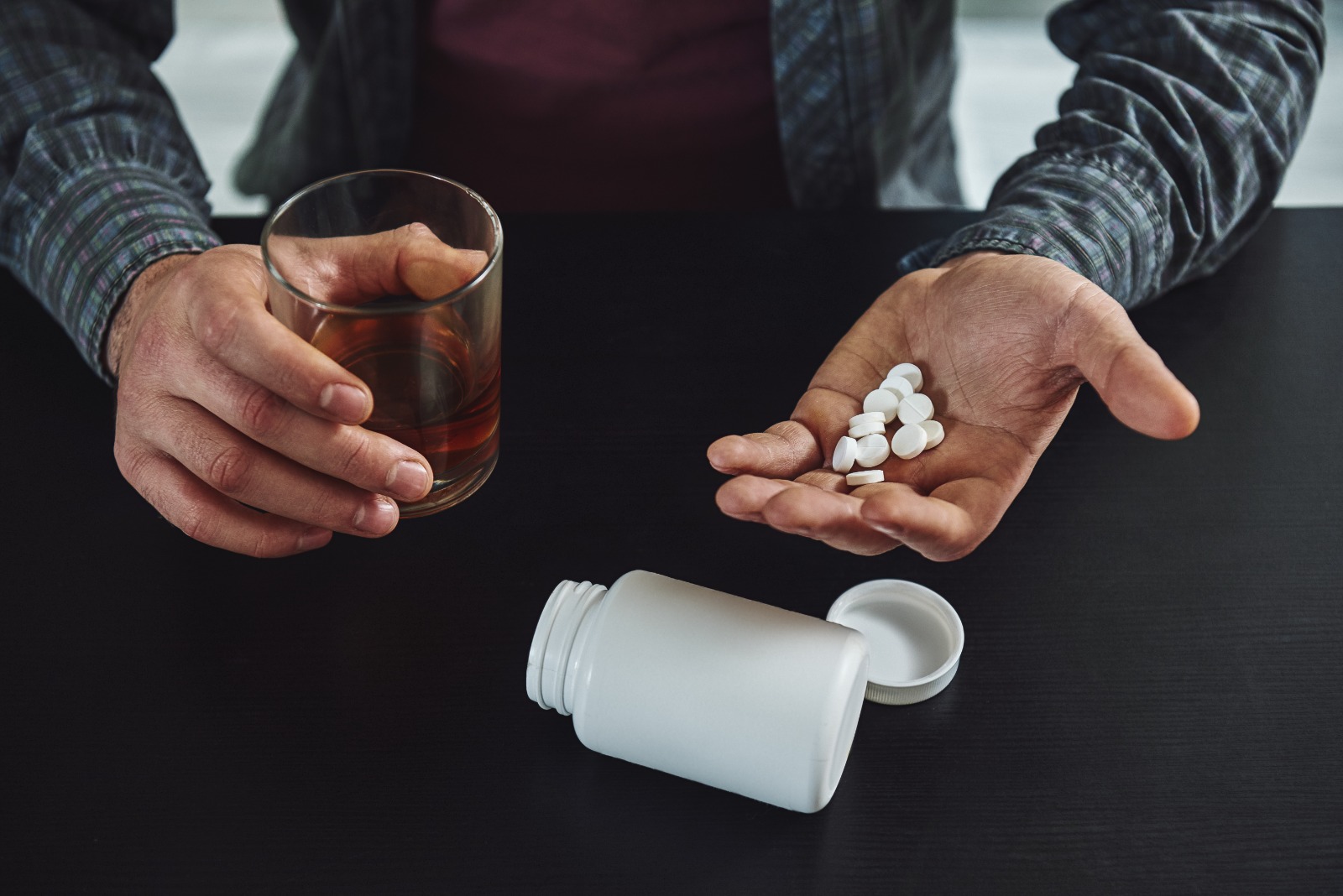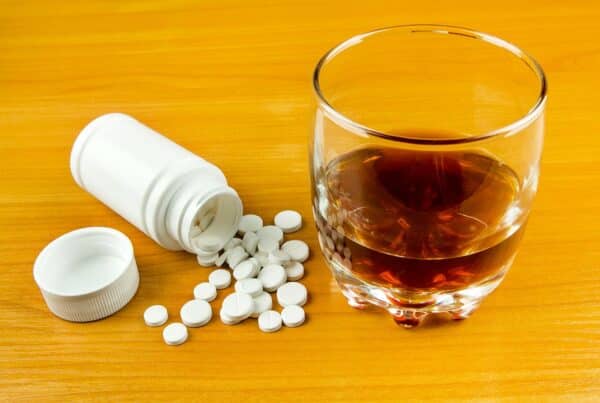
Table of Contents
- Why Mix Tylenol® (acetaminophen) and Alcohol Can Be Dangerous
- Risks Of Combining Tylenol® And Alcohol
- What Counts as “Moderate” or “Heavy” Drinking?
- How Much Tylenol® Is Too Much?
- Common Side Effects of Tylenol® — Especially When Combined With Alcohol
- Signs of Acetaminophen Toxicity
- How Serious Is Liver Damage from Tylenol® and Alcohol?
- Harm-Reduction Tips: If You Need to Use Tylenol and Drink
- Is Needing Both a Sign of a Bigger Problem?
- When to Talk to a Doctor
- Struggling With Tylenol® and Alcohol Use? We Can Help.
- Sources:
Most of us think of over-the-counter medications like Tylenol® as being harmless and risk-free, as long as we take them according to the package instructions. Similarly, we tend to approach legal substances, like alcohol, as being low-risk and something most people can tolerate without a serious problem most of the time.
But mixing these two substances — even occasionally — can put your liver and overall health at serious risk.
Here’s what you need to know about Tylenol® and alcohol, and the key reasons why you should never mix these two substances. We’ll also talk about how using both of these substances consistently can be a sign that there may be something more seriously wrong.
There’s a lot to cover, so let’s get started.
Why Mix Tylenol® (acetaminophen) and Alcohol Can Be Dangerous
Most of the time, controlled use and moderation are fine for both of these drugs. If that weren’t the case, then acetaminophen (generic Tylenol®) wouldn’t be the single most common drug ingredient [1] in the United States.
However, Tylenol® (acetaminophen) and alcohol are both processed through the liver. Taken on their own and in moderation, they’re generally safe for most people. But when combined, they compete for the same detoxification system in the liver — which can quickly lead to damage, especially when taken in large amounts or repeatedly over time.
When nearly a quarter of U.S. adults take Tylenol® every week,[2] and more than half of adults have had alcohol in the last month, that’s a serious consideration. Any time drugs are used as often as mentioned, it’s important to consider both the short-term and the long-term risks of use.
Even at recommended doses, acetaminophen can produce a small amount of a toxic byproduct called NAPQI. Your liver normally neutralizes this with a substance called glutathione, but heavy alcohol use depletes glutathione levels, reducing your liver’s ability to process the toxin. Over time, this increases the risk of acetaminophen toxicity — which can lead to acute liver failure, and even death if untreated.
Let’s talk about the specific risks from combining Tylenol® and alcohol.
Risks Of Combining Tylenol® And Alcohol
One of the most important considerations regarding the risk of combining Tylenol® and alcohol is that the combination gets more dangerous the more you take, and the more often you use either drug.
Since both of these drugs can seriously impact your liver and other parts of your body, the more continuously you use them, the more stressed your liver and other organs are likely to be already. Larger doses of either Tylenol® or alcohol, and especially both at the same time, can also increase the risk and severity of the side effects and risks.
Chronic alcohol use can also increase the risk of liver damage [3] from Tylenol® usage, even if the two drugs aren’t taken together; this is because your liver has less functionality for filtering out what needs to be than usual. People with three or more drinks daily may also be at risk of liver damage when they take Tylenol, even when they take only the recommended dose and don’t use Tylenol and alcohol together.
In addition to the risk of liver damage, both of these drugs can also irritate your stomach lining and may cause other digestive problems. If you notice nausea or heartburn from either of these drugs separately, you may have more severe versions of this irritation if you combine them. This is important to note because it makes it even more important to avoid taking both medications together if this is the case.
What Counts as “Moderate” or “Heavy” Drinking?
Understanding your alcohol consumption is key to accessing the risk of combining these two substances. According to the CDC:
-
Moderate drinking:
-
Up to 1 drink/day for women
-
Up to 2 drinks/day for men
-
-
Heavy drinking:
-
8+ drinks/week for women
-
15+ drinks/week for men
-
If you regularly drink more than this, even taking normal doses of acetaminophen (especially over multiple days) can put your liver at risk.
How Much Tylenol® Is Too Much?
For healthy adults:
-
Recommended dose: No more than 1,000 mg per dose, and no more than 4,000 mg per day
-
For people who drink regularly or heavily: No more than 2,000 mg per day, and only under medical supervision
Even if you don’t mix the two at the same time, using Tylenol® the day after drinking — especially during a hangover — can still strain your liver if it hasn’t fully cleared the alcohol from your system.
Common Side Effects of Tylenol® — Especially When Combined With Alcohol
Mixing alcohol and acetaminophen can make certain side effects more likely or more severe:
-
Nausea or vomiting
-
Abdominal pain
-
Indigestion or heartburn
-
Diarrhea or constipation
-
Skin rash
-
Dizziness or confusion
-
Fatigue
-
Rapid heartbeat
-
Liver pain (upper right abdomen)
Severe complications may include:
-
Liver failure
-
Kidney damage
-
Bleeding ulcers
-
Pancreatitis (painful inflammation of the pancreas)
Signs of Acetaminophen Toxicity
If you’ve taken acetaminophen and are experiencing any of the following, seek medical attention immediately:
-
Pain in the upper right abdomen (under ribs)
-
Yellowing of the skin or eyes (jaundice)
-
Dark urine
-
Unusual bleeding or bruising
-
Fatigue, confusion, or fainting
-
Loss of appetite
-
Excessive sweating
Call 911 or contact poison control right away — even if you feel okay. Symptoms of toxicity can be delayed.
How Serious Is Liver Damage from Tylenol® and Alcohol?
Liver damage is one of those conditions that we talk about, but that a lot of people don’t really understand unless they are dealing with it themselves or have a close friend or family member dealing with the condition. But when it comes to Tylenol® and alcohol usage, it’s important to have a good understanding.
Liver damage is also a complex issue because your liver can regenerate, given a chance to, but significant enough damage can be life-threatening and may require a liver transplant to resolve.
Your liver is critical for digesting food properly, [4] as well as filtering drugs and toxins out of your body before they can cause harm to other bodily systems.
Depending on your liver’s condition when you combine Tylenol® and alcohol, the amount you take, and your overall health, you might not have much damage from occasionally using small amounts of the drug together. But more chronic use, or larger doses, can cause profound damage to even a healthy liver and lead to more serious problems with a liver that already has some damage or cirrhosis.
Harm-Reduction Tips: If You Need to Use Tylenol and Drink
While avoiding the combination entirely is safest, here are ways to reduce risk:
-
Wait at least 24 hours after taking Tylenol® before drinking alcohol
-
Wait at least 24 hours after drinking before taking Tylenol®
-
Never exceed 3,000–4,000 mg/day, and lower that limit if you drink regularly
-
Read labels — acetaminophen is in over 600 OTC and prescription meds
-
Look for ingredient names like acetaminophen, APAP, acetaminop
-
Take Tylenol® with water — never with alcohol, soda, or on an empty stomach
-
Consider NSAID alternatives (like ibuprofen), but consult your provider first — they come with their own risks, especially to kidneys and stomach
-
Track what you consume: both alcohol and acetaminophen doses
-
Eat before drinking to help your body metabolize both alcohol and medication more safely
Is Needing Both a Sign of a Bigger Problem?
If you frequently feel the need to take Tylenol® while drinking — or use alcohol to manage pain — it may be a sign of an underlying issue:
-
Chronic pain that isn’t being properly managed
-
Dehydration or other physical stress
-
A potential alcohol use disorder (AUD)
Alcoholism isn’t just about frequency — it’s also about patterns. If you drink impulsively, to excess, or without thinking about what else is in your system (like medications), that could be a warning sign.
And, if you are dealing with alcohol addiction, remember that you aren’t alone, and there is help out there.
When to Talk to a Doctor
-
If you regularly take Tylenol® and also drink
-
If you’re dealing with chronic pain or recurring hangovers
-
If you’ve experienced any of the symptoms listed above
-
If you think you may be misusing alcohol or medications
Don’t wait until your body is in crisis. Prevention and early intervention can protect your liver — and your life.
Struggling With Tylenol® and Alcohol Use? We Can Help.
If you’re concerned about your drinking or your use of medications like Tylenol®, it might be time to talk to someone. Whether you’re struggling with alcohol use disorder or just trying to make safer decisions, Ocean Recovery can help.
Our team of compassionate professionals offers evidence-based addiction treatment in a supportive, healing environment. We’ll help you understand the root causes of your habits — and guide you toward lasting change.
Contact Ocean Recovery to learn more about our programs, the admissions process, or how we can help you take your next step toward recovery.
Sources:
- Consumer Healthcare Products Association. (n.d.). Acetaminophen. Retrieved from https://www.chpa.org/our-issues/otc-medicines/acetaminophen on 2023, February 12
- GoodRx. (n.d.). Is it safe to take tylenol® after drinking alcohol? Retrieved from https://www.goodrx.com/acetaminophen/tylenol-and-alcohol on 2023, February 12
- Ghosh A, Berger I, Remien CH, Mubayi A. National Library of Medicine. (2021, June 21). The role of alcohol consumption on acetaminophen induced liver injury: Implications from a mathematical model. Retrieved from https://pubmed.ncbi.nlm.nih.gov/33333080/ on 2023, February 13
- Mayo Clinic. (n.d.). Liver problems – Symptoms and causes. Retrieved from https://www.mayoclinic.org/diseases-conditions/liver-problems/symptoms-causes/syc-20374502 on 2023, February 13
OCEAN RECOVERY EDITORIAL GUIDELINES
The internet contains a vast amount of misinformation, but when it comes to your health only peer reviewed, research centered data matters. At Ocean Recovery, all content published throughout our website has been rigorously medically reviewed by a doctorate level clinician, and cross checked for medical accuracy. Our editorial process helps our readers trust that the information they are consuming is factual and based upon scientific data. Your health is our top priority, find out more about how we safeguard the integrity of information on our website. Read More About Our Process






